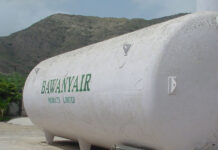KARACHI: British Deputy High Commissioner Steve Crossman has emphasised on taking more steps to increase trade between Pakistan and Britain, which at present is very low against the potential, at $ 2.6 billion last year.
There is need to build our trade capacity and the Pakistani government should make trade and investment processes easier and faster, he said while talking to the media and in short speech at a farewell dinner for him hosted by Mundia Group of Industries on Friday.
The reception was attended by prominent business, political and social figures who were welcomed by Mundia Group Chairman M Illyas Mundia.
The British Deputy High Commissioner said the trade between the two countries was good but it could be much better. There were many constraints, like Pakistan’s negative image, the difficult licensing process for foreign companies and complex taxation procedures. The law and order situation in Pakistan also needs further improvement.
“People want to invest in SMEs here in Pakistan; however it takes months to start a business due to slow and complex processes of completing formalities. Thus their investment is stuck,” he mentioned adding that unnecessary delays also created space for corruption.
He said over 100 British companies were operating and doing well in Pakistan and hinted that more companies might join soon if the investment and trade environment was made attractive.
He said the United Kingdom wants a prosperous and stable Pakistan. Around 1.2 million Pakistanis live in the UK and contribute to the British economy. He said that the people of Pakistani origin had even become members of the UK parliament.
Mundia Group of Industries Chairman M Illyas and M Junaid Mundia presented a Sindhi traditional shawl “Ajarak” and Sindhi cap to the Deputy British High Commissioner at the event.






















